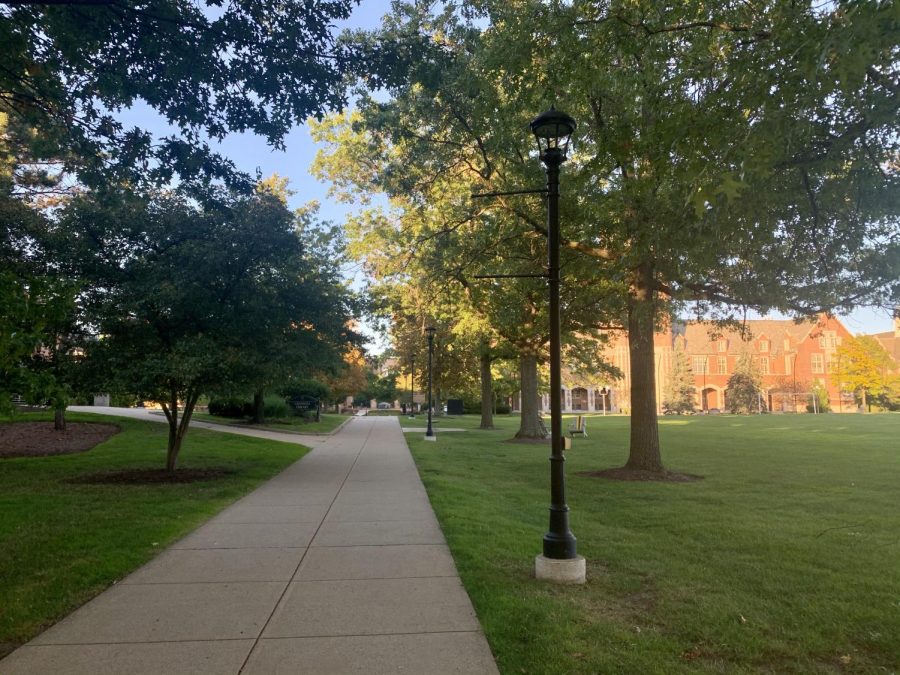Off campus student houses infected with COVID-19 despite campus closure
But students argue that it’s not because of the Warrensville atmosphere
Many students live in houses lining Warrensville Center Road, which is just a brief walk from campus.
Oct 8, 2020
Despite John Carroll University’s academic semester being moved entirely online, students living in houses near campus are still testing positive.
Some are attributing the spread of COVID-19 to off-campus houses that surround JCU and their suspected social gatherings. There have been 117 reported cases at JCU to date with 2 active cases at present, according to the website. The Carroll News was not able to ascertain from University sources how many are off-campus.
The JCU Student Health Center is currently open and accessible to students both on and off campus. Jan Krevh, director of the JCU Health and Wellness Center, stated in an interview that they “do not ask students where they live, only who they live with, if they test positive for COVID-19.” She added that the center is also providing over-the-counter medications and take-home instructions for all those impacted.
Many JCU students choose to live near campus despite the fact that classes are not on campus. Kate Malone, director of community relations for John Carroll, told The Carroll News that approximately 278 properties are rented by college students in University Heights. The unofficial estimate was developed by looking at location, number of renters on the application, area code of renters’ phone numbers and whether the renters provided a JCU email address and more.
Students and faculty are concerned that the reported behavior of these students may have an impact on the University’s return to campus in the spring semester. However, those living in off-campus residences who contract COVID-19 may not be completely at fault.
Shannon Atwell ‘21 said this is her first semester living with her roommates in their University Heights house.
“My friends and I don’t see that many people outside [of] our friend group,” she said. “The only thing that might make people suspicious is there are a lot of us that hang out together. But when it boils down to it, it’s only three houses that hang out together. … There aren’t that many big parties that bring a lot of people together, so we are all pretty much social distancing and hanging out with a select group of people, but it might freak people out because it’s a lot of us.”
Atwell said that she and her friend group do not wish to expose others, which is why they only see one another.
“My thing is, if you’re still staying within the same people constantly, it doesn’t really matter how big it [the group] is,” Atwell said.
Atwell says the main part of their lives that creates risks of contracting COVID-19 is their employment.
“Everyone has different jobs,” she said. “So other than us all hanging out together on the weekends, pretty much our only interaction is through work.”
“Personally, I haven’t paid much attention to the rumors because, at the end of the day, anyone could contract the virus,” said a student living in an off-campus house anonymously. “We know it’s contagious, we are taking the precautions to stay safe and yet people are still contracting it. I don’t think this speaks directly to students in the University Heights area because this is happening everywhere, around many college campuses where students are concentrated in a general area.
“I think with so many students living in off-campus houses in a relatively close area, it was inevitable some would contract the virus,” the student continued. “If one of your housemates got it, living with them put you at risk just as it would with a typical household. I think because the virus is so contagious, I am not surprised if there was a spike in the University Heights area off-campus students because we all live so close.
The students said that they are taking proper precautions to deal with the pandemic, even when someone in their household tests positive for the virus.
Atwell said that she and the majority of her household caught the virus, and each roommate had a different level of symptom severity.
“When that happened, we all stayed at home,” she said. “I didn’t see anyone besides my five other roommates who live here.”
“I and the other students I live with have been very committed to taking proper precautions,” the anonymous student said. “When I and a few of my housemates contracted the virus, we quarantined in our rooms, wore masks anywhere around the house and cleaned any surfaces we touched or were near to.
“Because we took these precautions, our housemates who did not initially test positive never contracted the virus, despite being in such close quarters with those of us who had the virus. It is really important to lay low during this time.”
Despite the students’ precautions, the stigma of their positive tests plagues their well-being, even after overcoming the virus.
“Telling people I tested positive for coronavirus makes it seem like, ‘Oh you’re back at school, you’re going out to all these crazy parties …’ when in reality, I genuinely think I got it from going to the gym I joined and working out,” Atwell said. “I felt like I was adhering to the guidelines. … I wasn’t doing anything out of the ordinary, and I just ended up catching it one day.”
The anonymous student asked the JCU community “to continue to wear a mask and take proper precautions” to further protect the population from the spread of the virus.
The student said, “At the end of the day, I am wearing a mask for the sake of others, not for myself. I think this is the way we should look at it.”














